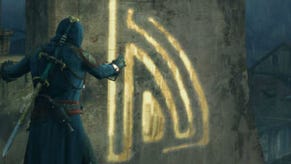Assassin's Creed: Unity's story is one of the best yet
Assassin's Creed: Unity makes a lot of changes to the franchise's traditional approach to storytelling - and that's a good thing. Spoilers ahead.
Assassin's Creed: Unity doesn't involve Desmond Miles or even an unnamed Abstergo employee. There's no faffing about in the real world, something I personally quite regret, as I enjoyed it a great deal. But maybe, after all, it's a good thing for the series as a whole.
When I included the omission of meta-narrative sequences in my list of things I love to hate about Assassin's Creed: Unity, I hadn't yet completed the main story line or begun investigating side content, so I reserved final judgment. I've now come to the end of Arno's tale, and had a go at some of the rift quests, and I'm ready to say: I think the change has been an overall positive one, even though I miss the modern-day sections.
SPOILER ALERT - The plot of Assassin's Creed: Unity
Assassin's Creed: Unity is set after Abstergo commercialises the Animus technology as Helix, a video game system which allows users to relive history for entertainment and education. When you fire the game up for the first time, it presents a series of screens and a menu which contextualise this, putting you, the player, in the role of a Helix user.
You kick off with a tutorial prologue set during King Phillip's purge of the Templars, but soon after that an agent of the Assassins breaks in, and informs you that Abstergo is using the Helix to highjack your brain's processing power for its own ends as well as present a false account of history. Rather than continue on, she suggests you work for the Assassins.
If you're not familiar with the Assassin's Creed meta-narrative, the Templars eventually became giant evil mega-corporation Abstergo, with plans to rule the world and destroy personal liberty, among other unpleasant goals. One of the ways it tries to do this is by recovering relics of the Precursors, a powerful race that inhabited Earth before human history. The Assassins work to defy Abstergo.
In terms of the ongoing plot of the Assassin’s Creed series, this entry is pretty missable. On the one hand, I find this a bit unsatisfying, because I’m interested and invested in the Assassin’s Creed universe. On the other hand, there are a lot of advantages to this approach, and I think Ubisoft would be right to employ it more often than not.
In Unity, your job as an Assassins initiate is to help track down the body of a sage, an individual with a lot of precursor DNA which could help Abstergo achieve its end by granting them access to more memories about Precursor technology. The Assassins have no idea where the body is, but one Assassin ancestor, Arno Dorian, might have killed him. You play through Arno's life, exploring snippets of memory harvested from traces of his DNA, hoping to find the bit where Arno disposes of the body.
In the end, it turns out it's super well hidden, and there's tea, crumpets and medals all round. Even if Abstergo harvests the same memories, they won't get to the body. It's a no-score win for the Assassins.
In terms of the ongoing plot of the Assassin's Creed series, this entry is pretty missable. Nothing in particular was achieved. Yes, a Templar threat was disarmed - or rather, discovered to be non-existent - but no points were scored on either side in the ongoing battle between the two factions.
On the one hand, I find this a bit unsatisfying, because I'm interested and invested in the Assassin's Creed universe. On the other hand, there are a lot of advantages to this approach, and I think Ubisoft would be right to employ it more often than not (but not every time!) when moving forward. Let's break it down.
1. Unity works really well as a stand-alone story.
You don't need to know anything about previous Assassin's Creed games in order to play and understand what's going on in Unity. The basic concepts (you can explore memories; there are people called Sages whose corpses are valuable; Templars are bad) are explained in the opening moments, and are all you need to know.
This has advantages for new players joining the franchise for the first time, of course, but it also means that returning players don't have to have remembered every single detail of the twisting plot of the previous games in order to follow what's going on. The whole thing is self-contained and straightforward, and as a lot of players complained about Assassin's Creed's science fiction plot in the past, that's probably a good thing - even if it's not as mentally satisfying as those of us who enjoyed that aspect would like.
2. The canon is protected.
Unity doesn't add anything to the ongoing meta-narrative, but it also doesn't take anything away. It doesn't make any additions to the universe that would cause problems for later stories. It doesn't introduce a new world-ending threat which Ubisoft would have to one-up next time, eventually leading the franchise into a farce.
If every Assassin’s Creed game has to contribute to a story spanning several entries and still deliver its own climactic pay-off at the end, you’re going to end up with a lot of bad writing.
If every Assassin's Creed game has to contribute to a story spanning several entries and still deliver its own climactic pay-off at the end, you're going to end up with a lot of bad writing, and of events happening for the sake of moving along the meta-narrative in a very particular direction, rather than a gradual unfolding of a story - if that's something Ubisoft decided to pursue again. It's sort of like how every few Doctor Who episodes the end of the world is a possibility. You stop caring; you don't feel tension. I love Doctor Who, and I won't hear any lip about that, but I'm perfectly comfortable saying the writing and especially plotting is occasionally dire, and I don't want that to happen to Assassin's Creed.
We know Ubisoft doesn't want that either; it protects the franchise canon very carefully, and launching games that don't p**s about with the lore very much is a good way to avoid a horrible tangle of bullshit. To be sustainable, the franchise needs these periods of rest, so that when the meta-narrative ramps up again it feels meaningful.
Next: two more arguments in favour of Ubisoft's new approach to storytelling in Assassin's Creed.
3. Arno's story seems stronger for the change.
Assassin's Creed: Unity feels like Ubisoft set out to make the adventure in the Animus less nonsensical - a real story, as opposed to something the writers had to cobble together to fit an existing set of missions and side-content. Arno has clear goals and motivations for everything he does. If you tune out, of course, it rapidly devolves into a bunch of people you don't know making you do things for reasons you don't understand, but for the first time in ages paying attention actually pays off. There's an investigative thread through the whole game that leads to the final boss: Arno is looking for whoever is ultimately responsible for a specific event, and everyone he offs along the way provides a clue to that puzzle.
It’s not award-winning stuff, but it makes sense and it’s not outrageous bullshit, and that’s a huge achievement in video games and a vast step up for the series to date.
That was kind of true in previous Assassin games, but you never expected it. You'd go after a guy because he was murdering a series of courtesans, for example, and it turned out by coincidence he was working with the baddies, bringing you one step closer to your goal. In Unity, you always know the target is involved, and you want to punish them, or to get information out of them. Everything else that happens - the love story, Arno's relationship to the brotherhood, Bellec's story - provides a series of peaks on the classic narrative chart, and for once seem to actually make sense within the context of the broader story, rather than interrupting it.
I think a part of the reason for this is that Ubisoft really pared down the number of NPCs you're supposed to pay attention to, and I'd like to talk about that later as well, but it's also just a much better example of plotting. It's not award-winning stuff, but it makes sense and it's not outrageous bullshit, and that's a huge achievement in video games and a vast step up for the series to date. I think the reason we get to enjoy this change is that Ubisoft's writing team was encouraged to focus on Arno's story, and weren't distracted by having to participate in the meta-narrative in some significant way. For once, Arno's story is the real story of the game, rather than a weak excuse for why you're killing Random NPC #17.
4. There's still some good secret stuff in there for hardcore fans.
Finally, while there's no modern day section to explore (it would be you, probably in your undies, and you can always just look down if you want to experience it) there is a bit of optional secret collecting and material from the meta-narrative to explore if you're keen.
It's no secret that the game contains what have been called time-travelling missions. What happens here is that Abstergo comes looking for a rogue agent in the system - you - and the Assassins create a server bridge, jumping you to another server to keep you safe while Abstergo performs its sweep. They can't just dump you in a live simulation somewhere else or you'd be detected straight away, so they hide you in out of the way bits of code - unstable, unfinished simulations of Paris in other time periods, as it happens.
This happens three times during the main storyline and each time it's pretty rad, but later on you can optionally go back and explore the unstable code to find useful data for the Assassins, and rescue trapped agents. Practically, this results in you playing obstacle courses to collect as many checkpoints as you can in a limited amount of time, earning a cash bonus for use in the main game. Each of these rift missions can be repeated several times, and doing so will net you encyclopaedia entries that add to the franchise lore.
So even though Assassin's Creed: Unity doesn't really move the meta-narrative along, it still gives interested fans a chance to learn more about what's going on.
I have no complaints
In the end, I was left feeling pretty satisfied by Unity's story, even though it doesn't add a great deal to the meta-narrative. The Animus story in Unity is one of the most coherent and interesting the series has produced to date. I still learned some interesting secrets about the franchise that satisfy my fangirl nerdery. Ubisoft didn't do anything stupidly ridiculous in the name of one-upping previous entries, which must be an incredible temptation in the triple-A world. And the whole of Unity is a beautiful self-contained unit accessible to new and old fans alike, regardless of their interest in slightly mental meta-narratives.
Well done, Ubisoft! More of this, please.












.jpeg?width=291&height=164&fit=crop&quality=80&format=jpg&auto=webp)


_O9MlrWs.png?width=291&height=164&fit=crop&quality=80&format=jpg&auto=webp)



